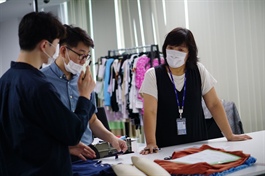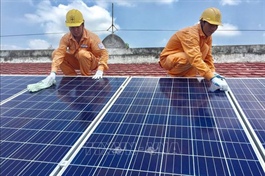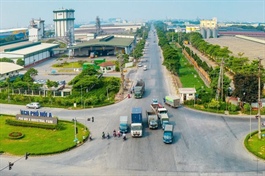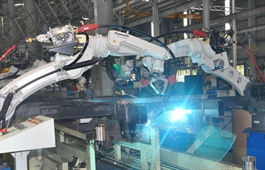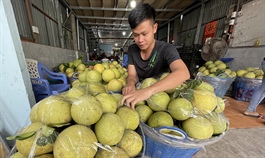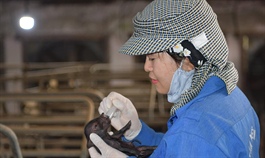Higher risk of default from solar power investment
Higher risk of default from solar power investment
The rush into solar power investment ventures has triggered a growing concern over loan defaults at banks as well as threatened to disrupt the country’s energy balance.
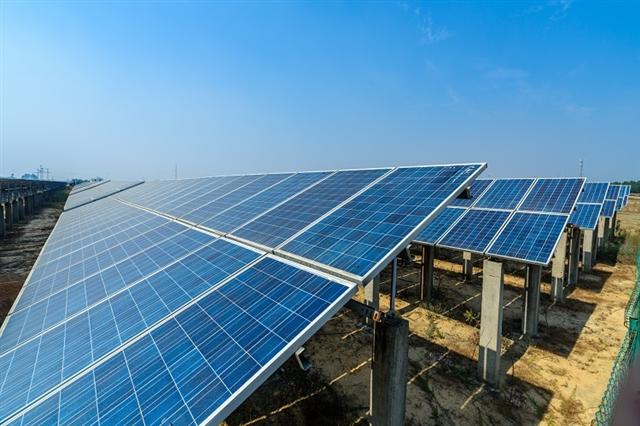
Higher risk of default from solar power investment
|
With high expectations for escalating profit margin rates and multiple tax incentives, scores of firms have rushed into solar power project investments in the past few years. These companies commonly use high financial leverage tools as up to 70-80 per cent of their capital sources come from loans and enterprise bonds.
According to a recent report by SSI Research, the bond value mobilised for solar power projects climbed to VND29.9 trillion ($1.3 billion) in 2020, a 254 per cent jump on-year.
In terms of credit sources, by the end of 2020, banks had poured VND84 trillion ($3.65 billion) into renewable energies, mostly lending to solar power projects.
That is because solar power is deemed a renewable energy that is stimulated for investment and development. Credit channelling into solar projects just accounts for 1 per cent of banks’ total outstanding loan balance.
Some experts, however, assumed that though the credit volume earmarked for solar power projects (including that into corporate bonds) is not too large, as it was mainly concentrated into several top players in this field.
If these developers faced defaults, both banks and retail investors would be on tenterhooks.
Of the total corporate bonds value for solar power projects in 2020, more than 42 per cent were to feed projects by privately-held Xuan Thien Group. Xuan Thien was reported using high financial leverage tools for its projects, so that the company could hardly pay back capital if the money flow got stuck.
Trung Nam Group – another major player in renewable energies – lodged a petition to the National Assembly’s Standing Committee, arguing that the group needed to borrow at several banks to carry out renewable energy projects.
The company then had the plan to sell power, receive revenue, and pay back the loans. However, due to continual power cuts, the company finds it difficult to realise its obligations.
Nguyen Quoc Hung, general secretary of the Vietnam Banks Association, told VIR that green credit including for solar power projects is a priority investment field, and before lending banks have carefully evaluated the projects’ feasibility and only lent to projects in the government’s planning scheme.
Hung noted that the quality of credit to lend to solar power projects has yet to be pegged at ‘an alarming level’, and the State Bank of Vietnam (SBV) has yet to deliver any warnings about credit sources to feed solar power projects.
Nguyen Tuan Anh, director general of the Department of Credit for Economic Sectors under the SBV, acknowledged that investments into renewable energy are somewhat challenging due to high costs, lengthy capital recouping, and market risks.
The credit sources of banks, however, are often short-term and bear fairly high raising cost.
Industry experts assumed that many solar power investors that were crying for help in the past few years indicate that this field is not quite lucrative to banks, businesses, and investors.
Especially, as the state power authority Electricity of Vietnam (EVN) has the right to refuse buying power in the power purchase agreement, it would be hard for banks, business, and investors to properly calculate their projects’ revenue streams during the evaluation processes.
Notwithstanding, in 2021 EVN envisages slashing 1.3 billion KWh of renewable energy, thus augmenting the risk towards banks and retail investors who are possessing corporate bonds by real estate developers..
Thus, the default threat is more apparent to solar power projects that are not present in the government planning without contracts to be plugged into the national power grid and using high financial leverage tools.
“Corporate bonds, particularly those issued by real estate developers and solar power projects, are highly risky. Retail investors with little knowledge about corporate finance analysis capacity should not run after these high margin rates as it is very risky. Besides this, most corporate bonds generally and solar power bonds particularly are not guaranteed by banks when it comes to payment capacity,” said senior economist Nguyen Tri Hieu.





